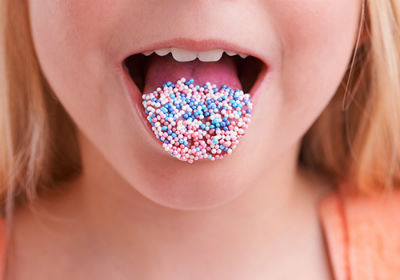 ‘If Andare lived today he won't have eaten a bit of sugar’ one of my friends said recently.
‘If Andare lived today he won't have eaten a bit of sugar’ one of my friends said recently.‘That’s true, today not even for adults but sugar is not good even for children’ I replied.
There are lot of such talks on reducing our sugar consumption. However, doctors say we are consuming a large amount of sugar daily without notice. How can such a thing happen? Is sugar essential to us?
According to doctors sugar is not essential to us as we get ample amount of sugar from many of the foods.
What is sugar?
Sugar is a kind of a Carbohydrate that gives nothing else but energy. It gives no other nutrition. One could ask if they give us energy why we shouldn’t eat sugar. Because there are many other foods such as rice, yams, grains, butter, fresh milk, and cheese that gives us energy.
Do you really need to eat sugar?
If you want to eat sugar anyway it is better to limit the amount of sugar to 06 spoons (25 g) per day. This includes sugar put in drinks and other foods.
This is somewhat confusing. Many of the food we get have a high concentration of sugar from cup of tea or coffee to bottle of cool drinks.
How can these be recognized?
We can easily identify food and drinks with high concentration of sugar. As an example,
X Cool drinks (Carbonated or not)
X Fruit drinks and cordials
X Sports drinks
X Energy drinks
X Flavoured milk or yoghurt drinks
X Tea and coffee with sugar
Unhealthy affects
There are many unhealthy affects of above things.
1. Sugar is included in sugar types/sucrose, fructose, dextrose, and maltose. They may cause obesity and non communicable diseases.
2. Caffeine, caffeine in drinks may cause high blood pressure, increase of heartbeat, anxiety and mental disorders and headaches.
3. Artificial flavours – headaches, food allergies, faints, anxiety and some cancers
Unhealthy affects
There are many unhealthy affects of above things.
1. Sugar is included in sugar types/sucrose, fructose, dextrose, and maltose. They may cause obesity and non communicable diseases.
2. Caffeine, caffeine in drinks may cause high blood pressure, increase of heartbeat, anxiety and mental disorders and headaches.
3. Artificial flavours – headaches, food allergies, faints, anxiety and some cancers
4. Preservatives – allergies, vomiting and headaches
5. Colourings - Cancers, genealogical changes and hyperactivity of children, vomiting, headaches.
6 Phosphoric – kidney stones and kidney failure.
7. Citric acid – diseases in joints, kidney stones
Can we know the sugar level of goods we buy?
Yes, clearly, by reading the label of the product. It indicates the ingredients and sugar level is also indicated by colour codes as high level of sugar in red, medium level in orange and low sugar in green.
Is it a law?
Yes it is. The total amount of sugar should be stated in label. It could be indicated in various ways as Sucrose, Fructose, Glucose, Honey, Cane sugar, Maple syrup, and Dextrose.
Many people are unaware of the volume of a teaspoon. It is 4.2 g that includes 16 kilocalories.
By this way you can know the amount of sugar included in the drink you consumed.
As an instance if you are drinking a bottle of 300 ml it contains 03 teaspoons of sugar and if it is 600 ml it will be 06 teaspoons. We can also take an idea with colour codes on the label.
v Green (low sugar) less than 02 g / 100 ml).
Can we know the sugar level of goods we buy?
Yes, clearly, by reading the label of the product. It indicates the ingredients and sugar level is also indicated by colour codes as high level of sugar in red, medium level in orange and low sugar in green.
Is it a law?
Yes it is. The total amount of sugar should be stated in label. It could be indicated in various ways as Sucrose, Fructose, Glucose, Honey, Cane sugar, Maple syrup, and Dextrose.
Many people are unaware of the volume of a teaspoon. It is 4.2 g that includes 16 kilocalories.
By this way you can know the amount of sugar included in the drink you consumed.
As an instance if you are drinking a bottle of 300 ml it contains 03 teaspoons of sugar and if it is 600 ml it will be 06 teaspoons. We can also take an idea with colour codes on the label.
v Green (low sugar) less than 02 g / 100 ml).
v Green (Medium sugar) 2-11 g in 100 ml.
v Red (high sugar) more than 11 g
Do you know the unhealthy affects of cool drinks?
There are number of affects that may amaze you.
v Obesity
Do you know the unhealthy affects of cool drinks?
There are number of affects that may amaze you.
v Obesity
v Diabetes
v Heart diseases
v Metabolic syndrome
v Dental cavities and diseases
v Kidney diseases
v Diseases in (Osteoporosis)
v Cancers
v Fade in skin colour/ wrinkling
v Senescence
Sugar is the main cause for obesity
Obesity has become a global issue and sugar is its main cause. How can it be? The excess strength gained by sugar is deposited in the body as fat. 240 ml of soft drinks or 115 ml Cola drinks have 100 kilocalories. If a bottle of drink is drunk daily the weight will increase in 05 kg in a year.
Get substitutes for sugar
There are many substitutes such as water, king coconut, natural fruit juice (sugar free), sugar free milk or tea.
Water is the best and cheapest drink
Water is essential for a healthy life. As Sri Lankans we are most fortunate to get water from many of areas in the country. For a healthy life you should drink 1.5-02 litres of water daily.
When you are active as in sports and exercises, you should drink a glass of water in every 20 minutes, and when wake up in the morning, one hour before meals, two hours before sleep and before taking short eats.
Heart and kidney patients should take medical advice on drinking water.
What are the benefits of drinking water?
There are number of benefits in drinking water according to doctors.
X Refreshment
Sugar is the main cause for obesity
Obesity has become a global issue and sugar is its main cause. How can it be? The excess strength gained by sugar is deposited in the body as fat. 240 ml of soft drinks or 115 ml Cola drinks have 100 kilocalories. If a bottle of drink is drunk daily the weight will increase in 05 kg in a year.
Get substitutes for sugar
There are many substitutes such as water, king coconut, natural fruit juice (sugar free), sugar free milk or tea.
Water is the best and cheapest drink
Water is essential for a healthy life. As Sri Lankans we are most fortunate to get water from many of areas in the country. For a healthy life you should drink 1.5-02 litres of water daily.
When you are active as in sports and exercises, you should drink a glass of water in every 20 minutes, and when wake up in the morning, one hour before meals, two hours before sleep and before taking short eats.
Heart and kidney patients should take medical advice on drinking water.
What are the benefits of drinking water?
There are number of benefits in drinking water according to doctors.
X Refreshment
X Fairness of skin
X Cure pains in joints
X Minimize risk of cancer
X Increases immunity
X Control body weight
X Removes poisonous matters in body
X Cures constipation
X Increases effectiveness
Bad qualities of sugar
Sugar is prone to be addicted. Therefore nutritionists have identified a 'vicious cycle of addiction to sugar' that describes the way a person is addicted to sugar.
Other foods with high amounts of sugar
As well as in soft drinks excessive sugar amount is also in toffee, chocolate, ice cream, ice packets, and food made by wheat flour such as bread, buns, cake, biscuit, rolls and pastries.
How to reduce the use of drinks with high amount of sugar?
This can be done easily.
1. Consider the amount of sugar included when selecting something to drink
Bad qualities of sugar
Sugar is prone to be addicted. Therefore nutritionists have identified a 'vicious cycle of addiction to sugar' that describes the way a person is addicted to sugar.
Other foods with high amounts of sugar
As well as in soft drinks excessive sugar amount is also in toffee, chocolate, ice cream, ice packets, and food made by wheat flour such as bread, buns, cake, biscuit, rolls and pastries.
How to reduce the use of drinks with high amount of sugar?
This can be done easily.
1. Consider the amount of sugar included when selecting something to drink
2. Take water instead of soft drinks at a restaurant
3. Make it a habit to carry a bottle of water when going on journeys
4. When you are thirsty first drink water. It will reduce the volume of other drinks taking later.
5. Avoid fruit drink, flavoured milk, yoghurt racks in super markets
6. Drink water when you feel hungry in between main meals
7. Reduce the amount of sugar put in tea, coffee and fruit juice at home
8. Take the lunch to school/workplace from home
9. Take a nutritious breakfast in early morning
10. Stop buying high sugar drinks, and milk.
11. Minimize mental depression
12. Exercise to waste additional energy.
If you follow above instructions properly you won't be a slave of sugar anymore.
Based on the booklet issued by the Ministry of Health, Nutrition and Indigenous Medicine.
Prepared by
Based on the booklet issued by the Ministry of Health, Nutrition and Indigenous Medicine.
Prepared by
Thushal Withanage




